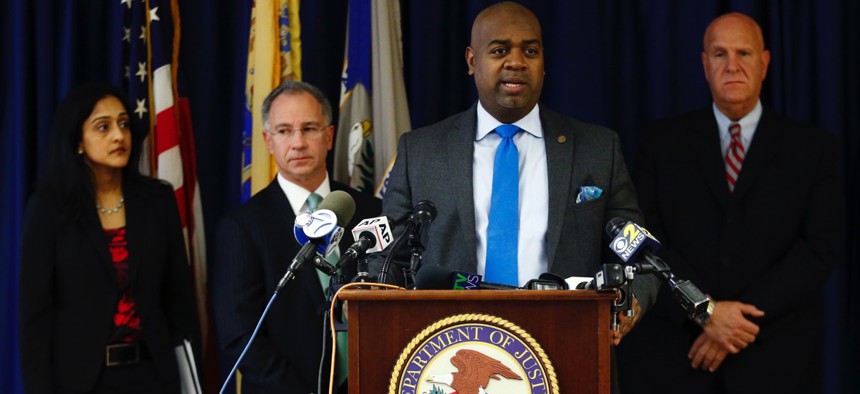Newark, Feds Hammer Out Police Reform ‘Consent Decree’

Newark Mayor Ras Baraka speaks during a news conference on the city's police settlement with the U.S. Department of Justice. Julio Cortez / AP Photo

Connecting state and local government leaders
A U.S. Department of Justice investigation into the New Jersey city’s police department that was completed in 2014 found issues with use-of-force and theft of property and money by officers.
After federal investigators concluded nearly two years ago that the police department in Newark, New Jersey, exhibited a variety of troubling practices, the U.S. Department of Justice on Wednesday said it had reached an agreement with the city on a set of law enforcement reforms.
The terms of the agreement, known as a “consent decree,” call for the Newark Police Department to improve officer training programs, revise search-and-seizure guidelines, amend use-of-force policies and deploy in-car and body-worn cameras. Under the consent decree, Newark will also need to create a civilian oversight panel meant to provide an outlet for residents’ concerns about the city’s police department.
“The department is challenged in fundamental ways and has engaged in a pattern and practice of unconstitutional policing in a broad range of areas,” U.S. Attorney Paul Fishman, of the District of New Jersey, said in a statement on Wednesday.
“Community trust has deteriorated, and that in turn has compromised the effectiveness of the Department,” Fishman added. “Today we are taking a major step toward breaking that cycle.”
A Justice Department investigation spanning from 2011 to 2014 found the Newark Police Department exhibited a “pattern or practice” of problematic and unconstitutional actions. Among these: pedestrian stops without an adequate legal basis, disproportionately detaining and arresting black residents, retaliating against people who objected to police behavior, using unjustified and excessive force, and stealing people’s money and property.
The findings do not mean most officers in the department violated the law. Instead, they indicate that the problematic practices appear to be typical occurrences, rather than isolated incidents.
The terms of the new agreement also call for improving the police department’s records management system, as well as data collection and analysis practices. Such technology upgrades have proven to be pricey in other jurisdictions carrying out similar reforms.
Last May, Moody’s Investors Service downgraded Newark to Baa3—a rating close to junk. New Jersey’s Local Finance Board began supervising the city’s finances in 2014. A city budget approved last September totalled $766 million, and included a 9 percent tax hike.
At the time of the Justice Department investigation, the Newark Police Department had about 1,000 sworn officers, with staffing numbers still recovering from 167 layoffs at the end of 2010 due to budget cuts.
Newark is New Jersey’s most populous city, with about 280,000 residents.
The city’s police department is not alone coming under federal watch. The Justice Department is enforcing 20 other accountability and reform-related agreements with law enforcement agencies around the U.S.
Newark’s consent decree is subject to the approval of a federal court before it becomes finalized.
The city and the Justice Department have proposed Peter Harvey to lead the team that will monitor the city’s compliance with the agreement. A former New Jersey attorney general, Harvey has experience with a previous consent decree case there, involving the state police. That agreement was dissolved in 2009, after about 10 years of federal oversight and monitoring.
Bill Lucia is a Reporter for Government Executive’s Route Fifty.

NEXT STORY: Chicago State University Close to Shutting Down; Florida’s Heroin Crisis Epicenter





